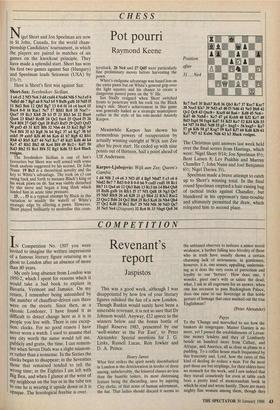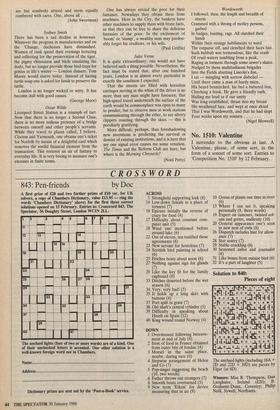COMPETITION
Revenant's report
Jaspistos
I. N Competition No. 1507 you were invited to imagine the written impressions of a famous literary figure returning as a ghost to London after an absence of more than 80 years. My only long absence from London was 1950-2, which I spent for reasons which it would take a bad book to explain in Bavaria, Vermont and Jamaica. On my return, I remember being astonished by the number of chauffeur-driven cars there were on the streets. Since then, as a chronic Londoner, I have found it as difficult to detect change here as it is in People you live with. There is one excep- tion: clocks. For no good reason I have never worn a watch. I used to assume that any city worth the name would tell me, Publicly and gratis, the time. I can remem- ber when Seven Dials was a slight misnom- er rather than a nonsense. In the Sixties the Clocks began to disappear; in the Seventies those that remained tended to tell the Wrong time; in the Eighties I am left with Big Ben, and when I glance at the wrist of my neighbour on the bus or in the tube ten to one he is wearing it upside down or it is Opaque. The horological freebie is over. This was a good week, although I was disappointed by how few of your literary figures relished the fun of a new London. Though Ruskin would surely have been a miserable revenant, it is not so sure that Dr Johnson would. Anyway, £12 apiece to the winners below and the bonus bottle of Hugel Reserve 1983, presented by our 'well-wisher in the Far East', to Peter Alexander. Special mentions for J. G. Links, Russell Lucas, Ron Jowker and D. A. Prince.
Henry James
What first strikes the spirit newly disembarked in London is the deterioration in modes of dress among, unbelievably, the leisured classes no less than the humble toilers, its most distressing feature being the discarding, save by aspiring City clerks, of that acme of human adornment, the hat. That ladies should discard it seems to the unbiased observer to indicate a minor moral weakness, a further falling into frivolity of those who in truth have usually shown a certain charming lack of seriousness; in gentlemen, however, it is, one senses, appalling, undermin- ing as it does the very roots of patriotism and loyalty to our 'betters'. How does one, I wonder, greet one's wife or salute the dead; what, I ask in all eagerness for an answer, when one has occasion to pass Buckingham Palace, does one raise to our Sovereign in that noble gesture of homage that once marked out the true Englishman?
(Peter Alexander) Pepys
To the 'Change and marvelled to see how the bankers do congregate. Master Gurney is no more, yet I passed the establishments of Levan- tine money lenders and they of Lombardy beside an hundred more from Cathay, and Afrique, and America; all as close as plums in a pudding. To a coffee house much frequented by this fraternity and, Lord, how the cares of this kind of dealing do reduce a man. For the most part these are but striplings, for their elders have no stomach for the work, and I saw indeed that they travail 'ceaselessly for even at table each bore a pretty kind of memorandum book in which he read and wrote hastily. There are many mighty fine women among them, though they
are but sombrely attired and seem equally cumbered with cares. One, above all . . .
(John Sweetman) Sydney Smith There has been a sad decline in hostesses. Whatever the progress in manufactories and on the 'Change, duchesses have diminished. Women of rank spend their evenings lecturing and collecting for the preservation of the tiger, the pigmy rhinoceros and birds emulating the dodo, but no longer provide those bird-trays for genius in life's winter — London dinners. Tom Moore would starve today. Instead of having turtle soup one is asked for funds to preserve the turtle.
London is no longer wicked or witty. It has become dull with good causes.
(George Moor) Oscar Wilde Liverpool Street Station is a triumph of tact. Now that there is no longer a Second Class, there is no more tedious pretence of a bridge between oneself and other people's servants. While they travel to places called, I believe, Clacton and Yarmouth, one obtains one's ticket for Norfolk by means of a delightful card which removes the sordid financial element from the transaction. This restores an air of fantasy to everyday life. It is very boring to measure one's excesses in finite terms. One has always envied the poor for their fantasies. Nowadays they obtain these from machines. Here in the City, the bankers have other machines to supply them with brute facts, so that they can be free to share the delicious fantasies of the poor. In the excitement of 'boom' or 'slump', a wealthy man may pardon- ably forget his creditors, or his wife.
(Paul Griffin) Jules Verne It is quite extraordinary; one would not have believed such a thing possible. Nevertheless, the fact must be stated that, after one hundred years, London is in almost every particular in exactly the condition I expected.
That the streets are filled with horseless carriages moving at the whim of the driver is no more than any man might have foreseen; that high-speed travel underneath the surface of the earth would be commonplace was open to many to predict; but to observe men at work stations communicating through the ether, to see silvery clippers coasting through the skies — this is peculiarly gratifying.
More difficult, perhaps, than foreshadowing new inventions is predicting the survival or demise of existing institutions, and it is here that my one signal error causes me some vexation. The Times and the Reform Club are here; but where is the Morning Chronicle?
(Noel Petty) Wordsworth I followed, then, the length and breadth of streets Crammed with a throng of motley persons, garbed In badges, bunting, rags. All clutched their hands Within their strange habiliments to ward The cutpurse off, and clenched their faces fast. Such hubbub was tremendous, like the crash Of cruel waters tumbling from a peak, Raging in torment through some sewer's sluice. Nudged by these multitudinous brigades Into the Fields abutting Lincoln's Inn, I sat — mingling with sorrow disbelief — Until there came a man of hardy mien, His beard besmirched, his bed a battered box, Clutching a book. He gave a friendly oath, Hailing me loud as if our amity Was long established, thrust into my breast His weathered face, and wept at once aloud That I was Wordsworth, and that he had slept Four weeks upon my sonnets (Nigel Blewrell)



















































 Previous page
Previous page